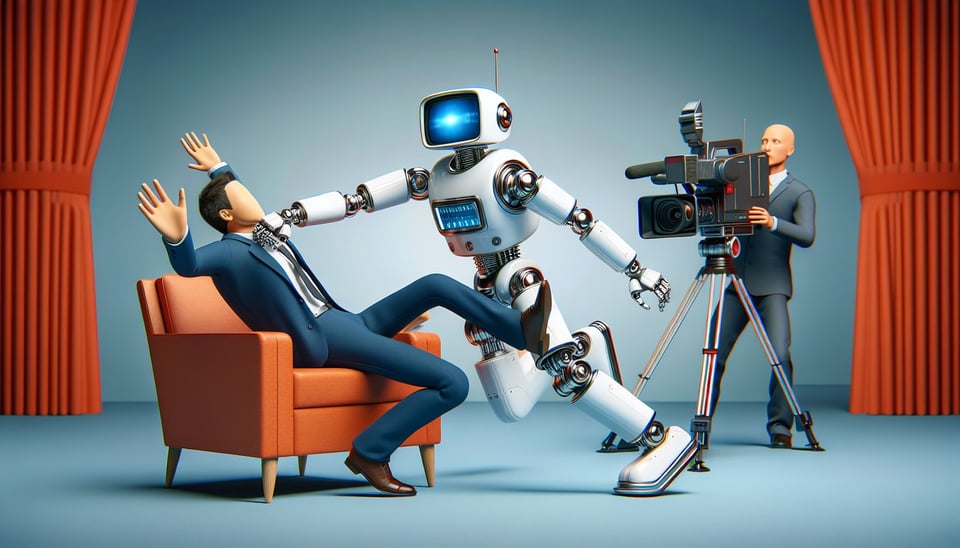FIVE: VAPORISED
FIVE: VAPORISED
I just had the most interesting look down the barrel of a loaded gun.
I didn't know the gun would be drawn. I didn't know it would be pointed at me. Nor do I believe that the person who drew the weapon and pointed it at me had any idea what he was doing.
Let me explain.
I had a call with a potential client, someone who has watched my presentation, read my book, and eagerly wants me to work with his staff to bring them up to speed on how to use AI.
All of this I can do, and had developed some thoughts about how all of it could happen.
But before we got there - after he'd explained his business and his needs - he pointed out that he could, if he wanted, just feed my video into ChatGPT, feed my book into ChatGPT - and ask it to manufacture some nice learning modules based on those works.
There aren't many moments when I literally feel my breath being taken away. This was most certainly one of them. It felt a bit like being punched in the chest - suddenly, unexpectedly, and fiercely. Everything receded down a tunnel for the briefest of moments as I contemplated the eternity before me: a world where I had been so thoroughly 'vaporised' by artificial intelligence my labor and intelligence and communication skills no longer mattered.
Or - to be more to the point - were no longer price competitive.
There is a world where that was sprinkled into the conversation as a bargaining chip, where my potential client slyly indicated that he was willing to DIY (mind you, using my own materials) rather than pay me. And that's fair enough: I have to be prepared for that sort of challenge to how I choose to value my work.
But this was the first time that challenge had appeared. And it had a quality to it that I knew I would need to remember. This is important.
Whether or not I secure this client, and whether or not this client decides to DIY, the questions raised in that fleeting interaction will never again leave my mind. This is a wholly new way of doing business, of valuing human labour. It serves me both well (and serves me right) that as someone working this coalface, I get hit by it early, fully and enduringly.

For the rest of my career as a professional futurist, presenter, consultant, podcaster (etc etc etc) I will be dogged by one question: do I provide better value for money than automation? What do I bring to the table that justifies the fact that - in order to pay rent in Sydney - I always need to charge 100x more than the price of automation?
It's important to note I've just made a gross oversimplification - because automation is never really as cheap as it looks. There's a whole lot of human labour going on behind-the-scenes to make automation appear seamless. It never is seamless, and - particularly with generative AI - the more automation you use, the greater the need for human oversight.
But the basic, raw, ugly economics of Mark versus generative AI are not going to substantially change, and are never going to change in my favour. That much I have to be prepared to accept. I can't ignore this new economic reality.
As much as this moment was a brutal loss of innocence, I still feel grateful for having been through it. I've been trying to puzzle through another problem: how can I communicate to businesses - particularly Australian businesses - that ignoring AI is not a long-term option? Doing so is to court a sudden moment of revelation when a bit of automation sweeps in and completely overturns the economics of some element of the business - making all businesses in that sector immediately and permanently irrelevant.
Call this the "Kodak Moment" - but a thousand times faster, and at a hundred times the scale. This isn't just one thing, it's everything. And if it's not this week or this month, or even next month or next year, it's on the calendar, somewhere. Ignoring AI today does not slow the progression of the calendar. Instead, resisting automation creates a technological 'overhang', within which a business' extinction level event will flourish.
That does not mean that every business needs to immediately grasp the nettle of workflow redesign around artificial intelligence. It does mean that the inevitability of those workflow redesigns can not be ignored - and further, that significantly delaying them opens a business to significant perils. Damned if you don't. Damned either way. Yet, when they accede to the inevitable, businesses can preserve some of their agency. They can, in some form, continue to trade.
And existence is preferable to extinction, right?
I've just experienced my own Kodak Moment - seen my own extinction level event. I have no choice but to adjust to the sudden reformulation of the value of my labor. This bell cannot be unrung. I can only embrace the future. To do otherwise is to court complete obliteration.
(Props to my friend Rob Tercek for his wonderfully apt term 'vaporised')